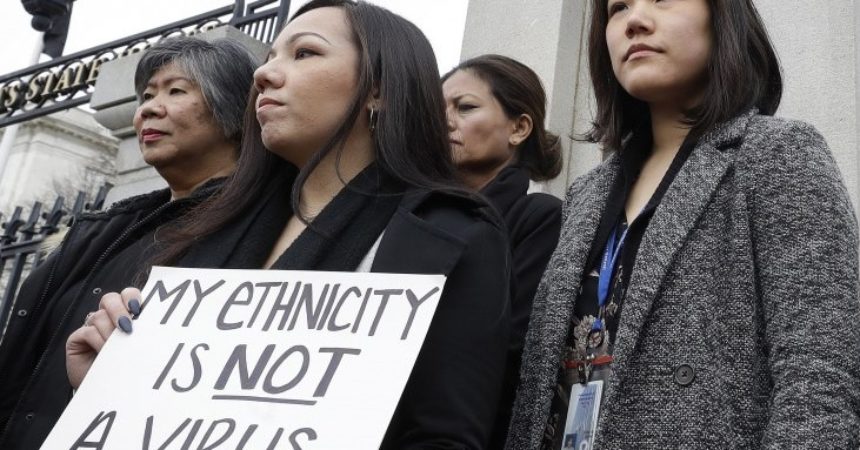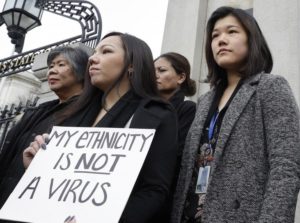
Local Asian business owners face corona-driven prejudice
Nothing is out of reach of this current pandemic that has brought changes to every part of everyday life.
Families are separated. Traveling is not happening or is very limited. Money is short for millions of families and millions of jobs have disappeared.
Asian-American business owners are feeling the pinch even harder, though. At the core is racism that stems from data that shows the pandemic started in Wuhan, China, months before Americans got wind of how serious coronavirus could become. Many locals are avoiding Asians since news broke that the deadly virus originated in China.
Tallahassee is no exception when it comes to discrimination against the Asian community. That is especially noticeable by those who run restaurants in Florida’s capital city.
Take Chris Gao, for example.

Asian Americans across the country are finding that they are being pointed at as the cause of coronavirus.
Photo special to the Outlook
Gao is staff manager at China Delight and she worries about the backlash, suspecting that some of it comes from the virus starting in Asia.
“We are more of a family style restaurant so dining in is a major part of our business so now we’re not allowed to do dining in so of course the business reviews greatly,” Gao said. “In the beginning, the Asian community, specifically the Chinese community, was quite concerned about are we going to face hate or at least hostile response from the community.”
Asian Americans nationwide are experiencing hate crimes at an increased rate, according to an FBI report published by CNN.
However, Gao said that so far people in Leon County have been mostly friendly and supportive of their business at a time that they need it most. Quite a few local patrons have expressed different views.
Leon County Commissioner Bill Proctor said he saw the racial problems coming long before the coronavirus. He contends that local Chinese businesses have been raking in profits from the patronage of African-Americans.
While the pushback that Asians might be realizing isn’t a result of an Asians against Blacks issue, Proctor said he wishes they would give more back to Blacks.
“If in fact the virus comes out of China, then we have every right to be suspect of things that are Chinese, so to speak,” said Proctor, who admittedly patronizes local Chinese restaurants.
Proctor went on to say that he is considering cutting off his support of Chinese restaurants.
“I have my favorite Chinese place and you have yours and everybody has theirs but no; I am not going back,” said Proctor. “I mean, thousands of Americans are not going to die, Black and White, and then I’m going to go respect a Chinese restaurant? That’s not going to happen by me.”
Proctor isn’t the only one holding such strong convictions. Other Americans have developed a begrudging attitude towards Asians since President Donald Trump first referred to coronavirus as being the “Chinese virus.”
While coronavirus has caused several problems across the country, racism shouldn’t be one of them. At least that’s the way that Tia Terry feels.
She is a regular at Roboto Tokyo Grill, and doesn’t believe it is fair to blame Asian people in America for what the country is currently enduring.
“I feel like it’s honestly unnecessary because from what I heard on the news people in Trump’s administration saying when the outbreak happened and they weren’t entirely forthcoming about it. That’s not okay that they weren’t forthcoming about it, but the fact of the matter is what are you going to do now.
“I don’t understand what Asian businesses and other Asian people have to do with somebody else’s decision not to let people know what’s happening. I think that’s unfair honestly, at the end of the day Asians didn’t come together and decide we’re going to do this against all of these other people.”
Terry believes that even if it’s true that the Chinese government is responsible for not being completely open with information regarding the virus, they should be the ones held accountable, not the entire Asian population.
Prior to Gov. Ron DeSantis relaxing a ban on restaurants dining in, Gao worried about whether China Delight will be forced to completely stop take-out service. However, with the first phase of reopening of the state starting last Monday, there is some reprieve.
Her concern lingered, though.
“Like every local business, we are trying to stay open,” Gao said. “We are trying our best to keep afloat and it’s kind of hard to keep business running. We were thinking about whether we should close.”
Gao is also concerned about seeing a spike in coronavirus cases in the state. That could hasten their decision to close, she said.







